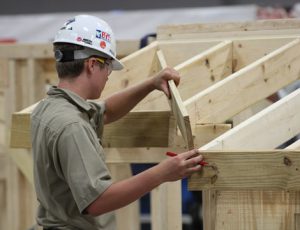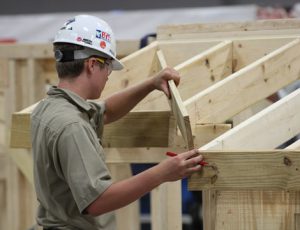If you’ve ever wondered why carpentry is such a challenging craft, you’re in for a treat! Carpentry is an ancient skill that requires both physical strength and precision. So, why is carpentry so hard? Let’s delve into the world of woodworking to find out!
Carpentry is a demanding craft that involves working with various tools and materials to create functional and aesthetically pleasing structures. From measuring and cutting wood to assembling intricate pieces, carpenters need a keen eye for detail and a steady hand. So, grab your hard hat and let’s explore the challenges that make carpentry such a rewarding yet demanding pursuit!
When it comes to carpentry, it’s not just about swinging a hammer or sawing through boards. This trade requires problem-solving skills, patience, and the ability to visualize the end result. The complexities of planning and executing carpentry projects can be both mentally and physically taxing. So, if you’ve ever wondered why carpenters are considered master craftsmen, get ready to unravel the secrets behind the demanding nature of this skillful trade!

Why is Carpentry So Hard?
Carpentry is a skilled trade that requires precision, knowledge, and physical labor. It is no surprise that many people find it challenging. In this article, we will explore the reasons why carpentry is considered hard and shed light on the skills and qualities needed to excel in this field.
The Complexity of Measurements and Math in Carpentry
One of the reasons why carpentry is challenging is the complexity of measurements and math involved. Accuracy is paramount in carpentry, as even a small miscalculation can lead to a flawed end product. Carpenters need to be well-versed in various units of measurements, understand fractions, and be able to calculate angles and dimensions accurately.
Furthermore, carpenters often have to work with blueprints and technical drawings that require interpreting complex symbols and measurements. They need to understand how different components fit together and visualize the final product, all while ensuring precise measurements and calculations.
Overcoming this challenge requires strong mathematical skills, attention to detail, and a keen eye for accuracy. Carpentry apprenticeships often include training in these areas to ensure that aspiring carpenters develop the necessary foundation.
The Physical Demands of Carpentry
Another factor that contributes to the perceived difficulty of carpentry is the physical demands it imposes. Carpentry is a hands-on profession that requires individuals to work with heavy tools, lift and move materials, and perform tasks that demand physical strength and stamina.
Carpenters often spend long hours on their feet, bending, reaching, and carrying heavy loads, which can be physically taxing. They may need to work in various weather conditions, such as extreme heat or cold, adding to the physical challenges of the job.
To succeed in carpentry, individuals need to have good physical fitness, strong manual dexterity, and the ability to handle the physical demands and strain that come with the profession. Regular exercise, proper ergonomics, and adherence to safety protocols are crucial for carpenters to avoid work-related injuries and maintain their physical well-being.
The Wide Range of Skills and Knowledge Required
Carpentry encompasses a wide range of skills and knowledge, from frame construction and cabinetry to flooring and finishing work. Carpenters need to be well-versed in various techniques, materials, and tools, and constantly update their knowledge to keep up with industry advancements.
Mastering carpentry requires proficiency in using different hand and power tools, understanding wood characteristics and behavior, and having a comprehensive understanding of construction techniques. Carpenters also need to be familiar with safety protocols and regulations to ensure compliance and create safe working environments.
Moreover, carpenters often need to collaborate with other professionals in the construction industry, such as architects, engineers, and electricians. Effective communication and the ability to work as part of a team are essential to ensure the successful completion of projects.
The Importance of Experience and Mentoring in Carpentry
Carpentry is a craft that is best learned through hands-on experience and mentoring. While theoretical knowledge is important, there is no substitute for the practical skills gained through years of practice and working alongside experienced carpenters.
Mastering carpentry techniques and problem-solving skills often comes from facing real-world challenges and learning from mistakes. The process of acquiring carpentry expertise is a continuous learning journey that takes time and dedication.
It is common for aspiring carpenters to start as apprentices, working under the guidance of experienced professionals. This mentorship allows them to learn the nuances of the trade, gain practical knowledge, and develop confidence in their abilities. However, this also means that beginners may face initial difficulties as they navigate the learning curve.
The Fulfillment and Rewards of Carpentry
While carpentry may be challenging, it offers numerous benefits and rewards that make the hard work worthwhile. For those passionate about creating tangible, functional structures and working with their hands, carpentry can be an incredibly fulfilling and satisfying career choice.
Carpenters have the opportunity to bring ideas to life, shape their surroundings, and contribute to the construction of buildings, furniture, and other structures that serve a practical purpose. The satisfaction of seeing a project through from start to finish and witnessing the tangible results of their labor can be immensely rewarding.
Moreover, carpentry provides opportunities for creativity, problem-solving, and personal growth. With experience and expertise, carpenters can take on more complex projects, develop their own unique style, and even start their own businesses.
The Importance of Skill Development in Carpentry
In order to excel in carpentry and overcome the challenges it presents, it is essential to focus on skill development. Here are three key areas to consider:
1. Continuous Learning and Training
Carpentry is a field that is constantly evolving with new techniques, materials, and technologies. It is crucial for carpenters to stay updated with industry advancements through continuous learning and training programs. This can be done through attending workshops, seminars, or pursuing advanced certifications. By expanding their knowledge and skills, carpenters can adapt to changing trends and offer the best solutions to their clients.
2. Improving Physical Fitness
As mentioned earlier, carpentry involves physical labor and demanding tasks. It is important for carpenters to prioritize their physical fitness to ensure longevity in their careers. Regular exercise, maintaining a healthy diet, and practicing proper ergonomics can contribute to improved strength, stamina, and overall well-being. Taking care of their bodies enables carpenters to work efficiently and reduce the risk of injuries.
3. Seeking Mentorship and Collaboration
Mentorship is invaluable in the carpentry profession. Finding experienced carpenters who are willing to share their knowledge and guide newcomers can significantly accelerate skill development. Additionally, collaborating with other professionals within the construction industry, such as architects or interior designers, can enhance carpenters’ understanding of project requirements and foster a more holistic approach to their work.
Overcoming Challenges in Carpentry
Carpentry may be hard, but with dedication, perseverance, and a passion for the craft, individuals can overcome the challenges they encounter. By embracing continuous learning, prioritizing physical fitness, and seeking mentorship, aspiring carpenters can develop the skills and resilience needed to succeed in this rewarding profession.
Key Takeaways: Why is Carpentry So Hard?
- Carpentry requires a lot of skill and precision.
- It involves working with tools and materials that can be difficult to handle.
- Carpentry projects often have complex measurements and calculations.
- It takes time and practice to master carpentry techniques.
- Carpentry can be physically demanding and require strength.
Frequently Asked Questions
Welcome to our FAQ section where we address common concerns about carpentry. Discover why this craft can be challenging, and find answers to your burning questions. Let’s dive in!
1. What makes carpentry such a challenging profession?
Carpentry can be considered hard due to a variety of factors. First and foremost, it requires a wide range of skills, including precision cutting, intricate measurements, and mastering various tools and techniques. Additionally, carpentry often involves working in physically demanding conditions and environments, such as tight spaces or extreme weather conditions.
Moreover, carpenters are required to possess problem-solving abilities, as every project comes with its own unique challenges and complexities. Adapting to unexpected setbacks or changes in plans can be mentally and physically demanding. Finally, carpentry often demands long hours of physical labor, which can be exhausting for individuals not accustomed to such tasks.
2. Is carpentry difficult to learn for beginners?
While carpentry can be challenging to learn, it is definitely possible for beginners to acquire the necessary skills with dedication and practice. Like any craft, it requires time, patience, and a willingness to continuously learn and improve. Starting with basic woodworking techniques and gradually progressing to more complex projects can help beginners build a solid foundation.
Seeking guidance from experienced carpenters, taking classes, or enrolling in apprenticeship programs can also be beneficial for those new to carpentry. By immersing yourself in the craft and seeking opportunities to learn, you can overcome the initial challenges and begin honing your carpentry skills.
3. What are some common mistakes that carpenters make?
Even experienced carpenters can make mistakes, as carpentry is a detail-oriented craft. Some common mistakes include inaccurate measurements, not accounting for material expansion or contraction, and using improper techniques or tools for specific tasks. Lack of proper planning and rushing through projects can also lead to errors.
It’s important for carpenters to double-check measurements, follow best practices, and be mindful of their work environment. Taking the time to plan and visualize the project, as well as seeking feedback from others, can help minimize mistakes. Remember, mistakes are a valuable learning opportunity in the carpentry journey.
4. How physically demanding is carpentry?
Carpentry can be physically demanding, as it often involves lifting heavy materials, spending long hours on your feet, and working in various positions. Carpenters may need to climb ladders, bend, and kneel for extended periods. They also often work in different weather conditions, which can add an extra level of physical stress.
While physical fitness is beneficial, carpenters can develop strategies to minimize the strain on their bodies. This includes practicing proper lifting techniques, utilizing ergonomic tools, taking regular breaks, and engaging in exercises that improve strength and flexibility. Taking care of your physical well-being is crucial for a sustainable carpentry career.
5. Is carpentry mentally challenging as well?
Absolutely! Carpentry is not only physically demanding but also mentally challenging. From interpreting blueprints and planning project layouts to troubleshooting and problem-solving on the spot, carpenters need to be able to think critically and adapt to unforeseen circumstances.
Moreover, carpentry requires attention to detail and a high level of focus to ensure precision in every cut and joint. It also involves coordinating and collaborating with other professionals, such as architects, contractors, and clients, which demands effective communication and teamwork skills. Success in the world of carpentry relies on both physical and mental capabilities.

FTF #17 Should I Become A Carpenter? My Experience
Summary:
Carpentry can be challenging, but don’t worry, it’s normal to find it hard at first. Remember, practice makes perfect, so keep working and you’ll improve over time. It’s important to be patient, ask for help when needed, and never give up on your carpentry dreams.
Carpentry requires physical strength, precision, and attention to detail. It’s a skilled trade that involves working with tools and materials to create and build things. While it can be difficult, with practice and perseverance, you can become a skilled carpenter and enjoy the satisfaction of seeing your creations come to life. So keep at it, and don’t be discouraged by the challenges along the way!
